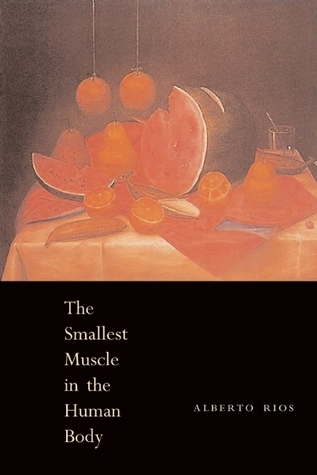
Alberto Ríos explains the world not through reason but magic. These poems—set in a town that straddles Mexico and Arizona—are lyric adventures, crossing two and three boundaries as easily as one, between cultures, between languages, between senses. Drawing upon fable, parable, and family legend, Ríos utilizes the intense and supple imagination of childhood to find and preserve history beyond facts: plastic lemons turning into baseballs, a grandmother’s long hair reaching up to save her life, the painted faith jumpers leaping to the earth and crowd below. This is magical realism at its shimmering best. The smallest muscle in the human body is in the ear. It is also the only muscle that does not have blood vessels; It has fluid instead. The reason for this is clear: The ear is so sensitive that the body, if it heard its own pulse, Would be devastated by the amplification of its own sound. In this knowledge I sense a great metaphor, But I do not want to be hasty in trying to capture or describe it. Words are our weakest hold on the world. —from "Some Extensions of the Sovereignty of Science" "Ríos is onto something new in his poetry—in the way that the real poets of any time always are."—American Book Review Alberto Ríos teaches at Arizona State and is the author of eight books of poetry, three collections of short stories, and a memoir about growing up on the Mexican border. He is the recipient of numerous awards and his work is included in over 175 national and international literary anthologies. His work is regularly taught and translated, and has been adapted to dance and both classical and popular music.
Author

In 1952, Alberto Alvaro Ríos was born on the American side of the city of Nogales, Arizona, on the Mexican border. He received a Bachelor of Arts from the University of Arizona in 1974 and a MFA in Creative Writing from the same institution in 1979. He is the author of several collections of poetry, including Dangerous Shirt (Copper Canyon Press, 2009); The Theater of Night (2007); The Smallest Muscle in the Human Body (2002), which was nominated for the National Book Award; Teodora Luna's Two Kisses(1990); The Lime Orchard Woman (1988); Five Indiscretions (1985); and Whispering to Fool the Wind (1982), which won the 1981 Walt Whitman Award, selected by Donald Justice. Other books by Ríos include Capirotada: A Nogales Memoir (University of New Mexico Press, 1999), The Curtain of Trees: Stories (1999), Pig Cookies and Other Stories (1995), and The Iguana Killer: Twelve Stories of the Heart (1984), which won the Western States Book Award. Ríos' poetry has been set to music in a cantata by James DeMars called "Toto's Say," and on an EMI release, "Away from Home." He was also featured in the documentary Birthwrite: Growing Up Hispanic. His work has been included in more than ninety major national and international literary anthologies, including the Norton Anthology of Modern Poetry. "Alberto Ríos is a poet of reverie and magical perception," wrote the judges of the 2002 National Book Awards, "and of the threshold between this world and the world just beyond." He holds numerous awards, including six Pushcart Prizes in both poetry and fiction, the Arizona Governor's Arts Award and fellowships from the Guggenheim Foundation and the National Endowment for the Arts. Since 1994 he has been Regents Professor of English at Arizona State University, where he has taught since 1982. He lives in Chandler, Arizona.